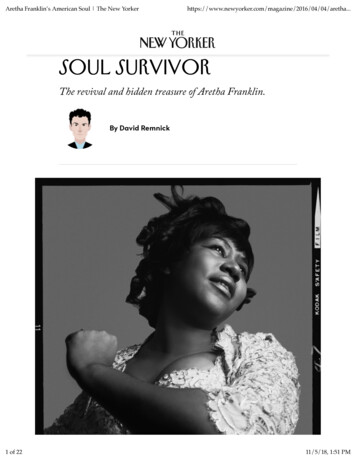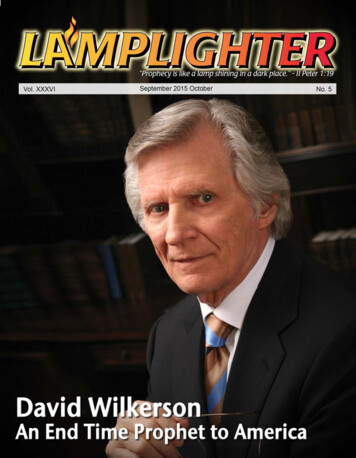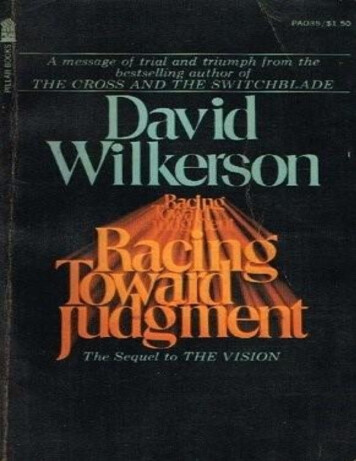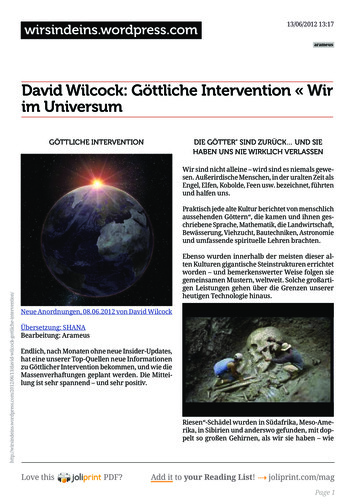
Transcription
Aretha Franklin’s American Soul The New 4/aretha.Soul SurvivorThe revival and hidden treasure of Aretha Franklin.By David Remnick1 of 2211/5/18, 1:51 PM
Aretha Franklin’s American Soul The New 4/aretha.Aretha Franklin, New York, October 14, 1968 (contact print).Photograph by Richard Avedon / the Richard Avedon FoundationLate on a winter night, Aretha Franklin sat in the dressing room ofCaesars Windsor Hotel and Casino, in Ontario. She did not wear theexpression of someone who has just brought boundless joy to a few thousandsouls.“What was with the sound?” she said, in a tone somewhere betweenperplexity and irritation. Feedback had pierced a verse of “My FunnyValentine,” and before she sat down at the piano to play “Inseparable,” atribute to the late Natalie Cole, she narrowed her gaze and called on a “Mr.Lowery” to !x the levels once and for all. Miss Franklin, as nearly everyonein her circle tends to call her, was distinctly, if politely, displeased. “For a timeup there, I just couldn’t hear myself right,” she said.On the counter in front of her, next to her makeup mirror and hairbrush,were small stacks of hundred-dollar bills. She collects on the spot or she doesnot sing. The cash goes into her handbag and the handbag either stays withher security team or goes out onstage and resides, within eyeshot, on thepiano. “It’s the era she grew up in—she saw so many people, like Ray Charlesand B. B. King, get ripped off,” a close friend, the television host and authorTavis Smiley, told me. “There is the sense in her very often that people areout to harm you. And she won’t have it. You are not going to disrespect her.”Franklin has won eighteen Grammy awards, sold tens of millions of records,and is generally acknowledged to be the greatest singer in the history ofpostwar popular music. James Brown, Sam Cooke, Etta James, Otis Redding,Ray Charles: even they cannot match her power, her range from gospel tojazz, R. & B., and pop. At the 1998 Grammys, Luciano Pavarotti called in2 of 2211/5/18, 1:51 PM
Aretha Franklin’s American Soul The New 4/aretha.sick with a sore throat and Aretha, with twenty minutes’ notice, sang “Nessundorma” for him. What distinguishes her is not merely the breadth of hercatalogue or the cataract force of her vocal instrument; it’s her musicalintelligence, her way of singing behind the beat, of spraying a wash of notesover a single word or syllable, of constructing, moment by moment, theemotional power of a three-minute song. “Respect” is as precise an artifact asa Ming vase.“There are certain women singers who possess, beyond all the boundaries ofour admiration for their art, an uncanny power to evoke our love,” RalphEllison wrote in a 1958 essay on Mahalia Jackson. “Indeed, we feel that if theidea of aristocracy is more than mere class conceit, then these surely are ournatural queens.” In 1967, at the Regal Theatre, in Chicago, the d.j. PervisSpann presided over a coronation in which he placed a crown on Franklin’shead and pronounced her the Queen of Soul.The Queen does not rehearse the band—not for a casino gig in Windsor,Ontario. She leaves it to her longtime musical director, a seventy-nine-yearold former child actor and doo-wop singer named H. B. Barnum, to assembleher usual rhythm section and backup singers and pair them with some localunion horn and string players, and run them through a three-hour scan ofanything Franklin might choose to sing: the hits from the late sixties andearly seventies—“Chain of Fools,” “Spirit in the Dark,” “Think”—along withmore recent recordings. Sometimes, Franklin will switch things up and pullout a jazz tune—“Cherokee” or “Skylark”—but that is rare. Her greatestconcern is husbanding her voice and her energies. When she wears a fur coatonstage, it’s partly to keep warm and prevent her voice from closing up. Butit’s also because that’s what the old I’ve-earned-it-now-I’m-gonna-wear-itgospel stars often did: they wore the mink. Midway through her set, shemakes what she calls a “false exit,” and slips backstage and lets the bandnoodle while she rests. “It’s a !fteen-round !ght, and so she paces herself,”3 of 2211/5/18, 1:51 PM
Aretha Franklin’s American Soul The New 4/aretha.Barnum says. “Aretha is not thirty years old.” She is seventy-four.Franklin doesn’t get around much anymore. For the past thirty-four years, shehas refused to y, which means that she hasn’t been able to perform infavorite haunts from the late sixties, like the Olympia, in Paris, or theConcertgebouw, in Amsterdam. When she does travel, it’s by bus. Not aGreyhound, exactly, but, still, it’s exhausting. A trip not long ago from herhouse, outside Detroit, to Los Angeles proved too much to contemplateagain. “That one just wore me out,” she said. “It’s a nice bus, but it tookdays!” She has attended anxious- yer classes and said that she’s determined toget on a plane again soon. “I’m thinking about making the ight from Detroitto Chicago,” she said. “Baby steps.”Even if the concert in Windsor was a shadow of her stage work a generationago, there were intermittent moments of sublimity. Naturally, she has lostrange and stamina, but she is miles better than Sinatra at a similar age. Andshe has survived longer than nearly any contemporary. In Windsor, shelagged for a while and then ripped up the B. B. King twelve-bar blues “SweetSixteen.” Performing “Chain of Fools,” a replica of the Reverend Elijah Fair’sgospel tune “Pains of Life,” she managed to make it just as greasy as whenshe recorded it, in 1968.VIDEO FROM THE N! YORKERMalcolm Gladwell Challenges LeBron and Predicts an N.B.A.Champion4 of 2211/5/18, 1:51 PM
Aretha Franklin’s American Soul The New 4/aretha.Before the show, I was talking with people in the aisles. More than a few saidthey hadn’t seen Franklin or paid much attention to her recordings for years.It was an older crowd, but they hadn’t come to see an oldies show. Whatreawakened them, they said, was precisely what had reawakened me: a video,gone viral, of Franklin singing “(You Make Me Feel Like) A NaturalWoman” at last December’s Kennedy Center Honors. Watch it if you haven’t:in under !ve minutes, your life will improve by a minimum of forty-seven percent.Aretha comes out onstage looking like the fanciest church lady inChristendom: !erce red lipstick, oor-length mink, a brocaded pink-andgold dress that Bessie Smith would have worn if she’d sold tens of millions ofrecords. Aretha sits down at the piano. She adjusts the mike. Then sheproceeds to punch out a series of gospel chords in 12/8 time, and, if you havean ounce of sap left in you, you are overcome. A huge orchestra wells upbeneath her, and four crack backup singers sliver their perfectly timed accents(“Ah-hoo!”) in front of her lines. Aretha is singing with a power that rivalsher own self of three or four decades ago.Up in the !rst tier, sitting next to the Obamas, Carole King is about to fall5 of 2211/5/18, 1:51 PM
Aretha Franklin’s American Soul The New 4/aretha.over the rail. She is an honoree, and wrote “A Natural Woman” with her !rsthusband, Gerry Goffin. From the moment Franklin starts the !rst verse—“Looking out on the morning rain, / I used to feel . . . so uninspired”—Kingis rolling her eyes back in her head and waving on the music as if in a kind ofecstatic possession. She soon spots Obama wiping a tear from his cheek.(“The cool cat wept!” King told me later. “I loved that.”)King hadn’t seen Franklin in a long time, and when she had Franklin was notperforming at this level of intensity. “Seeing her sit down to play the pianoput me rungs higher on the levels of joy,” King says. And when Franklin getsup from the piano bench to !nish off the song—“That’s a piece of theatre,and she’s a diva in the best sense, so, of course, she had to do that at theperfect moment”—the joy deepens.King recalls how the song came about. It was 1967, and she and Goffin werein Manhattan, walking along Broadway, and Jerry Wexler, of AtlanticRecords, pulled up beside them in a limousine, rolled down the window, andsaid, “I’m looking for a really big hit for Aretha. How about writing a songcalled ‘A Natural Woman.’ ” He rolled up the window and the car drove off.King and Goffin went home to Jersey. That night, after tucking their kidsinto bed, they sat down and wrote the music and the lyrics. By the nextmorning, they had a hit.“I hear these things in my head, where they might go, how they might sound,”King says. “But I don’t have the chops to do it myself. So it was likewitnessing a dream realized.”Beyond the music itself, the moment everyone talked about after Franklin’sperformance at the Kennedy Center was the way, just before the !nal chorus,as she was reaching the all-out crescendo, she stripped off her mink and let itfall to the oor. Whoosh! Dropping the fur—it’s an old gospel move, a gestureof emotional abandon, of letting loose. At Mahalia Jackson’s wake, Clara6 of 2211/5/18, 1:51 PM
Aretha Franklin’s American Soul The New 4/aretha.Ward, one of Aretha’s greatest in uences, threw her mink stole at the opencasket after she sang “Beams of Heaven.” The fur is part of the drama, theroyal persona. When Franklin went to see Diahann Carroll in a production of“Sunset Boulevard,” in Toronto, she had two seats: one for her, one for themink.Backstage in Windsor, I asked Franklin about that night in D.C. Her moodbrightened. “One of the three or four greatest nights of my life,” she said.he cool cat wept, King had marvelled. When I e-mailed PresidentObama about Aretha Franklin and that night, he wasn’t reticent in hisreply. “Nobody embodies more fully the connection between the AfricanAmerican spiritual, the blues, R. & B., rock and roll—the way that hardshipand sorrow were transformed into something full of beauty and vitality andhope,” he wrote back, through his press secretary. “American history wells upwhen Aretha sings. That’s why, when she sits down at a piano and sings ‘ANatural Woman,’ she can move me to tears—the same way that Ray Charles’sversion of ‘America the Beautiful’ will always be in my view the most patrioticpiece of music ever performed—because it captures the fullness of theAmerican experience, the view from the bottom as well as the top, the goodand the bad, and the possibility of synthesis, reconciliation, transcendence.”TSo much of this history—the transformation of hardship and sorrow, thespiritual uplift after boundless pain, gospel after blues—is a particularinheritance of the black church. In “The Souls of Black Folk,” W. E. B. DuBois writes that, “despite caricature and de!lement,” the music of the blackchurch “remains the most original and beautiful expression of human life andlonging yet born on American soil.” From the days of slavery, the blackchurch was a refuge, a safe house of community, worship, and speech, and asthe decades passed the music of Sunday morning became increasinglyassociated with the music of the night before. Thomas A. Dorsey, the fatherof modern gospel, was a whorehouse piano player and the musical director of7 of 2211/5/18, 1:51 PM
Aretha Franklin’s American Soul The New 4/aretha.the Pilgrim Baptist Church, in Chicago. His songs were sung at rent parties,and at the funeral of Dr. King. His gospel and his barrelhouse blues—“Precious Lord, Take My Hand” and “It’s Tight Like That,” “Peace in theValley” and “Big Fat Mama”—possess, in his words, “the same feeling, agrasping of the heart.”Aretha’s father, Clarence LaVaughn Franklin, was the most famous blackpreacher of his day, and by far the most profound in uence on the course ofher life. He was born in 1915 and grew up in Sun ower County, in theMississippi Delta. This was the same landscape that bred Robert Johnson,Son House, Howlin’ Wolf, Muddy Waters, and Fannie Lou Hamer. B. B.King, another Delta neighbor, described in his memoirs that commonground: the Klan and the cross burnings; the fury suppressed in every childwho encountered a lynching—the “strange fruit” hanging from a tree near thecourthouse. “I feel disgust and disgrace and rage and every emotion thatmakes me cry without tears and scream without sound,” King wrote.When C. L. Franklin was around !fteen, he experienced a vision: he saw asingle plank on the wall of his house engulfed in ames. “A voice spoke to mefrom behind the plank,” he told the ethnomusicologist Jeff Todd Titon, “andsaid something like ‘Go and preach the gospel to all the nations.’ ” By thetime he was eighteen, he was a circuit rider, an itinerant preacher hitchhikingfrom church to church.Eventually, he landed a pulpit in Memphis, where he attracted notice as “theking of the young whoopers,” a style of preaching that begins with a relativelymeasured exposition of a passage from Scripture and then crescendos into anecstatic, musical ight, with the kind of call-and-response that becameembedded in the music of James Brown.Franklin left Memphis in 1944 and, after a two-year residence at a church inBuffalo, settled in Detroit, at the New Bethel Baptist Church. There he8 of 2211/5/18, 1:51 PM
Aretha Franklin’s American Soul The New 4/aretha.established a reputation, acquiring one nickname after another—the BlackPrince, the Jitterbug Preacher, the Preacher with the Golden Voice.In those days, New Bethel was on Hastings Street, the spine of ParadiseValley, which was the center of the black community. Detroit had swelledwith black migrants from the South, and Hastings Street was dense withchurches and black-run beauty salons, barbershops, funeral homes; aroundthe corner from New Bethel was the Flame Show Bar and Lee’s Sensation.Franklin was, in the phrase of one of his congregants, “stinky sharp.” Hedrove a Cadillac and took to wearing slick suits and alligator shoes.Franklin, his wife, Barbara Siggers, and their four children—Erma, Cecil,Carolyn, and Aretha—lived in a parsonage house on East Boston Boulevard,among black professionals and businesspeople. There were six bedrooms anda living room with silk curtains and a grand piano. Yet, while Franklin livedlarge, he preached a kind of black liberation theology—Baptist, but in ectedat times with the more convulsive accents of the Pentecostal, or “sancti!ed,”church. As his scrupulous biographer Nick Salvatore writes, he was “uniqueamong his fellow ministers in that he welcomed all of the residents ofHastings Street—prostitutes, drug dealers and pimps as well as thebusinessmen, professionals, and the devout working classes.”Franklin gained national fame by recording his sermons. The albums sold inthe hundreds of thousands. On Sunday nights, he could be heard on WLAC,a Nashville-based station that covered half the country. John Lewis, a leaderof sncc and a congressman since 1987, recalls listening to Franklin on theradio when he was growing up, in Pike County, Alabama. “He was a masterat building his sermon, pacing it, layering it, lifting it level by level to a climaxand then !nally bringing it home,” Lewis wrote in his memoir “Walking withthe Wind.” “No one could bring it home like the Reverend Franklin.”As a girl, Aretha took it all in: Sunday mornings and the nights before. She9 of 2211/5/18, 1:51 PM
Aretha Franklin’s American Soul The New 4/aretha.was thoroughly absorbed in the church life of New Bethel and in the culturallife of her living room, which, at times, seemed to represent the epicenter andgenealogy of African-American music. Sitting on the stairs, she watched ArtTatum and Nat Cole play the piano. Oscar Peterson, Duke Ellington, DellaReese, Ella Fitzgerald, Billy Eckstine, and Lionel Hampton came to visit.Dinah Washington coached the girls on their singing. The Reverend JamesCleveland, a pillar of the gospel world, showed Aretha how to play gospelchords. The kids nearby included Diana Ross, Smokey Robinson, and theroster of what became Motown.As C. L. Franklin’s fame grew, Salvatore writes, so did his penchant fordrinking, womanizing, and worse. In 1940, he had fathered a child with atwelve-year-old girl, and he remained unrepentant. He could also be abusiveto the women in his life. In 1948, when Aretha was six, her mother leftDetroit to live in Buffalo. The children saw her occasionally, but there wasalways a looming and powerful sadness in the house. As Mahalia Jackson, aclose friend of the Franklins, put it, “The whole family wanted for love.” C.L. Franklin’s mother helped care for the children, as did a string of friends,secretaries, and lovers, including Clara Ward, of the Ward Singers, one of thegreat gospel vocalists of her time. Barbara Siggers died in 1952.In the mid-!fties, Franklin started the C. L. Franklin Gospel Caravan andtoured the country for weeks at a time, preaching his greatest hits: “TheEagle Stirreth Her Nest,” “Dry Bones in the Valley,” “The Man at the Pool.”Little Sammy Bryant, a dwarf who was a preternaturally talented singer,often opened the show and appeared alongside gospel stars like the DixieHummingbirds, Sister Rosetta Tharpe, and the Soul Stirrers, featuring SamCooke. Aretha was in his entourage, playing piano and singing. The voice—ringing, powerful, soulful—and the musical guile were there from the start.She could riff, bending notes as if high on the neck of a guitar; she hadfantastic range and command of every effect, from melisma to circling the10 of 2211/5/18, 1:51 PM
Aretha Franklin’s American Soul The New 4/aretha.beat. These techniques came into play in her career in R. & B., soul, and pop,but “all that was echt gospel,” according to the scholar Anthony Heilbut.When Franklin was !fteen, she recorded several gospel songs, among them“Never Grow Old” and “While the Blood Runs Warm.” She also saw a greatdeal of life, including the libertine atmosphere surrounding the gospel-musicscene. By the time she recorded those !rst songs, she was pregnant with hersecond child. She left school and went on the road for, more or less, the restof her life.retha did not inherit a purely religious and musical legacy. The Franklinhouse was also political. She was, by the standards of Paradise Valley, ayoung woman of status and privilege, but she suffered the same humiliationsas any black woman travelling through the South or venturing into the whiteprecincts of Detroit. By the time of the murder of Emmett Till, in 1955, C.L. Franklin had opened New Bethel up to the movement, and, from hispulpit, he denounced segregation and white supremacy. When Dr. King cameto Detroit, he stayed with the Franklins.AAretha, too, joined the movement. At the same time, she yearned for largerstages. She saw how Sam Cooke had crossed over into R. & B. as if it werethe most natural of passages. In 1960, when she was eighteen, she moved toNew York and signed with Columbia Records. This marked the start of anextended apprenticeship under John Hammond, who had been behind thecareers of Billie Holiday and Count Basie. Hammond had it in his mind thatAretha should be the next great jazz singer, even though the form was nolonger ascendant. It wasn’t until 1966, when Franklin went to work with JerryWexler and Ahmet Ertegun, at Atlantic Records, that she really made herhits in R. & B. But at Columbia, even singing standards like “Skylark” and“How Deep Is the Ocean,” she broke into the secular world. Franklin had herfather’s support and the example of Cooke, but she felt compelled to publisha column, in 1961, in the Amsterdam News, saying, “I don’t think that in any11 of 2211/5/18, 1:51 PM
Aretha Franklin’s American Soul The New 4/aretha.matter I did the Lord a disservice when I made up my mind two years ago toswitch over.” She went on, “After all, the blues is a music born out of theslavery day sufferings of my people.”On June 23, 1963, C. L. Franklin helped Dr. King organize the Walk toFreedom, a march of more than a hundred thousand people throughdowntown Detroit. At Cobo Hall, King, acknowledging “my good friend” C.L. Franklin, delivered a speech !lled with passages that he recycled, twomonths later, at the March on Washington. “This afternoon I have a dream,”he told the crowd. “I have a dream,” that “little white children and littleNegro children” will be “judged by the content of their character and not thecolor of their skin.”MORE FROM THIS ISSUEApril 4, 2016Letter from La PazShouts & MurmursFictionFine Dining for a BetterWorld?Grain Forecast“God’s Work”By Shon Arieh-LererBy Kevin CantyBy Carolyn KormannKing later con!ded to C. L. Franklin, “Frank, I will never live to see forty.”At Dr. King’s funeral, in April, 1968, Aretha was asked to sing Thomas12 of 2211/5/18, 1:51 PM
Aretha Franklin’s American Soul The New 4/aretha.Dorsey’s “Precious Lord.” She was now a central voice in both the blackcommunity, eclipsing her father, and in the musical world. She had crossedover.he songs on her !rst records for Atlantic—“Do Right Woman, DoRight Man,” “Respect,” “Dr. Feelgood,” “(You Make Me Feel Like) ANatural Woman,” “Think,” “Chain of Fools”—were the resolution of herapprenticeship. Leaving behind the American Songbook for a while and!nding just the right blend of the church and the blues, she was nowcelebrated as the greatest voice in popular music. “Respect” and “Think”became anthems of feminism and black power and stand alongside“Mississippi Goddamn,” “Busted,” and “A Change Is Gonna Come.” “Daddyhad been preaching black pride for decades,” she told the writer David Ritz,“and we as a people had rediscovered how beautiful black truly was and wereechoing, ‘Say it loud, I’m black and I’m proud.’ ”TAt the same time, Franklin found that the strains of life as a star, as a mother,as a daughter to her tempestuous father were at times unbearable. Ted White,her !rst husband—they married in 1961 and divorced eight years later—wasa jumped-up street hustler who abused her. In 1969, when her father let aradical organization called the Republic of New Africa use the sanctuary atNew Bethel, the night ended in a bloody gun battle between the group andthe Detroit police. The next year, she came out onstage, in St. Louis, andstarted singing “Respect” but then walked off, unable to continue. Thepromoter announced that Franklin had suffered “a nervous breakdown fromextreme personal problems.” She soon recovered enough to perform, but sherarely seemed unburdened, except in the studio and onstage.“I think of Aretha as Our Lady of Mysterious Sorrows,” Wexler wrote in hismemoirs. “Her eyes are incredible, luminous eyes covering inexplicable pain.Her depressions could be as deep as the dark sea. I don’t pretend to know thesources of her anguish, but anguish surrounds Aretha as surely as the glory of13 of 2211/5/18, 1:51 PM
Aretha Franklin’s American Soul The New 4/aretha.her musical aura.”Franklin’s vulnerability has brought with it an intense desire for controlthat often leads to still more anguish. When it came time to do anautobiography, she enlisted Ritz, a skilled biographer and ghostwriter whohad produced fascinating books with Ray Charles, Etta James, BettyeLaVette, and Smokey Robinson. He found her a singularly resistant subject.She insisted on stripping the book of nearly anything gritty or dark.Published in 1999, it reads like an extended press release. “Denial is herstrategy for emotional survival,” Ritz told me. It was only at the microphone,in her music, he concluded, that Franklin felt in command. There are reportsthat she has, in recent years, been struggling with cancer, but her friends sayshe’d never admit to such a thing, “not even on her deathbed.”Fifteen years after the autobiography was published, and opped, Ritzpublished an unauthorized biography, !lled with material that he hadaccumulated over time from intimate personal and professional sources. Thewoman who emerges is a musical genius and a pivotal !gure in the culturalhistory of the black freedom movement; she is also someone who has sufferedcountless losses, been mistreated in many ways, and at times has reactionsthat try the patience of her associates, creditors, family, and friends. Franklindenounced the book: “Lies and more lies!” But none of the sources, includingthose closest to her, have backed away.Even Beyoncé has had the experience of displeasing Franklin. The occasionwas the 2008 Grammy Awards. Beyoncé, working from lines on aTeleprompter that were likely not of her own devising, introduced TinaTurner to the audience as “the Queen.” With due respect to Tina Turner, thisis Aretha’s title, as surely as it is Elizabeth II’s, and Franklin, who is easilywounded, issued a scathing proclamation. It was a “cheap shot,” she said.A14 of 22larger consequence of Franklin’s craving for control is that her audience11/5/18, 1:51 PM
Aretha Franklin’s American Soul The New 4/aretha.has been denied one of her greatest treasures. Not long ago, Ahmir KhalibThompson, the drummer and bandleader better known as Questlove, postedthis on his Instagram feed: “Of all the ‘inside industry’ stuff I’ve been privy tolearn about nothing has tortured my soul more than knowing one of thegreatest recorded moments in gospel history was just gonna sit on the shelfand collect dust.”Questlove was referring to the holy grail of Aretha Studies—a !lmed version,never seen in public, of “Amazing Grace,” two gospel concerts that Franklingave in January, 1972, at the New Temple Missionary Baptist Church, insouth-central Los Angeles. Pop music has long tantalized its completist fanswith rumors of “rare footage”: there was “Eat the Document,” featuring ascene in which a stoned John Lennon teases an even more stoned Bob Dylan(“Do you suffer from sore eyes, groovy forehead, or curly hair?”); and therewas “Cocksucker Blues,” Robert Frank’s collaboration with the RollingStones, featuring Mick Jagger snorting coke. Both !lms are now pretty easyto !nd—and neither is essential.The !lm of “Amazing Grace” is another matter. Atlantic issued a recordingfrom the concerts as a double LP, in 1972, and it has sold two million copies,double platinum, making it the best-selling gospel record of all time. It isperhaps her most shattering and indispensable recording. As Franklin hassaid repeatedly, “I never left the church.” The black church was, and is, ineverything she sings, from a faltering “My Country, Tis of Thee” at Obama’s!rst inaugural to a knockout rendition of Adele’s “Rolling in the Deep,” twoyears ago, on the Letterman show.By 1971, Franklin was at her peak, with a string of hits and Grammys, butshe was also preparing for a return to gospel. In March, she played theFillmore West, in San Francisco, the ultimate hippie venue. The !lm of thatdate is on YouTube, and you can hear her singing her hits, fronting KingCurtis’s astonishing band, the Kingpins. She wins over a crowd more15 of 2211/5/18, 1:51 PM
Aretha Franklin’s American Soul The New 4/aretha.accustomed to the Mixolydian jams of the Grateful Dead. And her surpriseduet with Ray Charles on “Spirit in the Dark” is far from the highlight.A few songs into the set, Franklin plays on a Fender Rhodes the openingchords of Paul Simon’s “Bridge Over Troubled Water,” weaving hypnoticgospel phrases between her backup singers (“Still waters run deep . . .”) andthe B-3 organ lines of Billy Preston, a huge !gure in gospel but recognized bythe white audience as the “!fth Beatle,” for his playing on the “Let It Be”album. Just as Otis Redding quit singing “Respect” after hearing Aretha’sversion (“From now on, it belongs to her”), Simon and Art Garfunkel foreverhad to compete with the memory of this performance. Simon, who wrote thesong a year before, was inspired by a gospel song, Claude Jeter and the SwanSilvertones’ version of “Mary, Don’t You Weep.” Jeter included an improvisedline—“I’ll be your bridge over deep water if you trust in my name”—andSimon was so clearly taken with it that he eventually gave Jeter a check.Daphne Brooks, who teaches African-American studies at Yale, aptlydescribes the Fillmore West performance as a “bridge” to the “AmazingGrace” concerts that were just a few months away.Franklin enlisted her Detroit mentor, the Reverend James Cleveland, to singand play piano, and the pastor Alexander Hamilton to conduct the SouthernCalifornia Community Choir. The gospel concert in Los Angeles opens with“Mary, Don’t You Weep,” a spiritual based on Biblical narratives of liberationand resurrection, and recorded, in 1915, by the Fisk Jubilee Singers. It ispossibly the most wrenching music on the album. Countless performers haverecorded the song—the Soul Stirrers, Inez Andrews, Burl Ives, James Brown,Bruce Springsteen—but Franklin, who was never in better voice, seemspossessed by it. She delivers a pulsing, haunted version, taking ights oflyrical improvisation, note after note soaring over single syllables. In herreading, the blues always resides in gospel, and somehow this is her version ofgrace.16 of 2211/5/18, 1:51 PM
Aretha Franklin’s American Soul The New 4/aretha.Chuck Rainey, her bass player in the early seventies, told me that Aretha’svoice was so emotionally powerful that at times she would throw the band outof the groove. “Aretha came to me once and held my hand and
L ate on a winter night, Aretha Franklin sat in the dressing room of Caesars Windsor Hotel and Casino, in Ontario. She did not wear the expression of som










